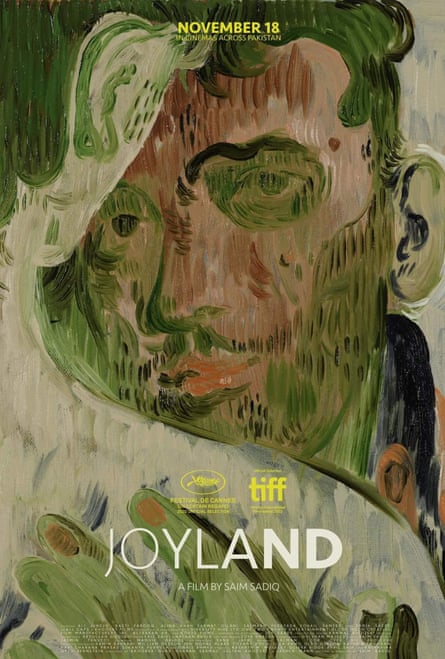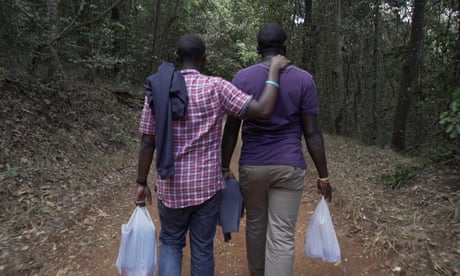Exclusive: Alina Khan, star of award-winning Joyland, speaks out as the movie’s licence for domestic release is revoked, putting its Oscar contention in doubt

Alina Khan, who plays a trans dancer in the Urdu film Joyland.
Photograph: Courtesy of Alina Khan
Zofeen T Ebrahim
Zofeen T Ebrahim
in Karachi
Tue 15 Nov 2022
The transgender star of an award-winning Pakistan film that depicts a love affair between a man and a trans women has said she is very sad at the government’s decision to ban the movie and hopes it will be reversed.
Alina Khan, who stars in Joyland, the first major Pakistani motion picture to feature a trans actor in a lead role, said: “I’ve been very sad. There’s nothing against Islam and I don’t understand how Islam can get endangered by mere films.”
The 24-year-old added: “The Pakistani trans community was also very upset.”
Joyland, which is Pakistan’s contender at the Oscars, was to go on national release on Friday, but was banned over the weekend following pressure from hardline Islamic groups who called the film “repugnant”.
Set in Lahore, the film tells the story of Haider, a married man who joins a dance troupe and falls in love with the lead transgender dancer, Biba, played by Khan.
Khan told the Guardian she adores Biba.
The transgender star of an award-winning Pakistan film that depicts a love affair between a man and a trans women has said she is very sad at the government’s decision to ban the movie and hopes it will be reversed.
Alina Khan, who stars in Joyland, the first major Pakistani motion picture to feature a trans actor in a lead role, said: “I’ve been very sad. There’s nothing against Islam and I don’t understand how Islam can get endangered by mere films.”
The 24-year-old added: “The Pakistani trans community was also very upset.”
Joyland, which is Pakistan’s contender at the Oscars, was to go on national release on Friday, but was banned over the weekend following pressure from hardline Islamic groups who called the film “repugnant”.
Set in Lahore, the film tells the story of Haider, a married man who joins a dance troupe and falls in love with the lead transgender dancer, Biba, played by Khan.
Khan told the Guardian she adores Biba.

A poster for Joyland, designed by the Pakistani artist Salman Toor.
Photograph: Courtesy of Alina Khan
“She’s a badass, strong-willed, fiercely independent, dominating, outspoken woman, everything that I am not; I loved the role I played,” said Khan. When she was offered the role, she was relieved not to play an “oppressed” character “which is the life for most transgenders in Pakistan”.
Khan said she was rejected by her family when she came out as trans. “My family did not accept me, but neither did society.” She was told she embarrassed relatives, and her mother was constantly angry with her. “She would tell me not to make exaggerated hand gestures like a woman while talking, to sit like a boy and not be in the company of girls,” said Khan. Her siblings called her khusra – a derogatory term, which was originally used to refer to eunuchs but is also a slur against trans people. But as Khan said: “I had never met a transgender [person] in my life so did not know what they were like.”
Joyland has been hailed on the festival circuit. It was the first Pakistani film to be selected as an official entry at Cannes in May, winning two festival awards and receiving a standing ovation in a packed Salle Debussy theatre.
“Tears were trickling down my face while I continued smiling. I don’t know whether the tears were of joy, were for all the hard work that I put in, or for my struggles since I was a child and that continue,” said Khan, who made her screen debut in the short film Darling in 2019. “For the first time in my life, I felt my talent preceded my gender, I was given so much respect.”
After such international success, her family welcomed her with open arms. “They accepted me finally. They realised that I was not earning by begging or doing sex work,” she said.
In August Joyland won best film from the subcontinent at the Indian Film Festival of Melbourne, last month it received the top award at Zagreb’s film festival and it is Pakistan’s entry for best international feature film at next year’s Oscars, which has received the backing of the Nobel laureate Malala Yousafzai, who joined the film as executive producer.
However, the film had caused controversy at home. Mushtaq Ahmad Khan, a senator in the Jamaat-e-Islami (JI) party, called Joyland “cultural terrorism” and criticised the government for the “shameless” act of allowing its release. “I condemn it and will use every legal step to stop Joyland’s release,” he said. “Glamourising transgenders in Pakistan, as well as their love affairs, is a direct attack on our beliefs.”
“She’s a badass, strong-willed, fiercely independent, dominating, outspoken woman, everything that I am not; I loved the role I played,” said Khan. When she was offered the role, she was relieved not to play an “oppressed” character “which is the life for most transgenders in Pakistan”.
Khan said she was rejected by her family when she came out as trans. “My family did not accept me, but neither did society.” She was told she embarrassed relatives, and her mother was constantly angry with her. “She would tell me not to make exaggerated hand gestures like a woman while talking, to sit like a boy and not be in the company of girls,” said Khan. Her siblings called her khusra – a derogatory term, which was originally used to refer to eunuchs but is also a slur against trans people. But as Khan said: “I had never met a transgender [person] in my life so did not know what they were like.”
Joyland has been hailed on the festival circuit. It was the first Pakistani film to be selected as an official entry at Cannes in May, winning two festival awards and receiving a standing ovation in a packed Salle Debussy theatre.
“Tears were trickling down my face while I continued smiling. I don’t know whether the tears were of joy, were for all the hard work that I put in, or for my struggles since I was a child and that continue,” said Khan, who made her screen debut in the short film Darling in 2019. “For the first time in my life, I felt my talent preceded my gender, I was given so much respect.”
After such international success, her family welcomed her with open arms. “They accepted me finally. They realised that I was not earning by begging or doing sex work,” she said.
In August Joyland won best film from the subcontinent at the Indian Film Festival of Melbourne, last month it received the top award at Zagreb’s film festival and it is Pakistan’s entry for best international feature film at next year’s Oscars, which has received the backing of the Nobel laureate Malala Yousafzai, who joined the film as executive producer.
However, the film had caused controversy at home. Mushtaq Ahmad Khan, a senator in the Jamaat-e-Islami (JI) party, called Joyland “cultural terrorism” and criticised the government for the “shameless” act of allowing its release. “I condemn it and will use every legal step to stop Joyland’s release,” he said. “Glamourising transgenders in Pakistan, as well as their love affairs, is a direct attack on our beliefs.”

Alina Khan, left, with Joyland’s director Saim Sadiq at the Cannes film festival in May 2022.
Photograph: Anadolu Agency/Getty Images
He is spearheading a campaign to repeal the 2018 law that enshrined transgender rights in Pakistan law.
Cancelling the film’s licence, which puts its Oscars’ contention in doubt, the Ministry of Information and Broadcasting, said: “Written complaints were received that the film contains highly objectionable material which do not conform with the social values and moral standards of our society and is clearly repugnant to the norms of ‘decency and morality’ as laid down in Section 9 of the Motion Picture Ordinance, 1979”.
Shahzadi Rai, a Karachi rights activist, was not surprised by the ban. “Of course this was expected. We’re going towards religious extremism. I think soon Pakistan will become another Afghanistan. The trans community is extremely disappointed in the government for caving in to the pressure of the clerics.”
She added that Alina Khan had “put us up in the mainstream in a good way”.

Kenya bans LGBTQ+ documentary for ‘promoting same-sex marriage’
Lucky Khan, a trans singer, said seeing such a film win awards was awesome. “I’d only seen our community begging on streets, performing dances or in commercial sex work.”
Merub Moiz Awan, a trans woman, tweeted: “Had a cisgender woman or man instead of Alina Khan played the role of a khwajasira dancer, they’d have had no issues with it. But because it’s an actual khwajasira doing so, they have issues. They want khwajasira people to be just begging in the streets.”
The international success of Joyland has brought Alina Khan other film offers. “I would like us to be more visible in showbiz as we are very much part of society, like men, women and children are,” she says, adding: “This film deserves an Oscar … it deserves all the awards out there.
“I hope I have opened doors for others in our community, to pursue their dreams.”
He is spearheading a campaign to repeal the 2018 law that enshrined transgender rights in Pakistan law.
Cancelling the film’s licence, which puts its Oscars’ contention in doubt, the Ministry of Information and Broadcasting, said: “Written complaints were received that the film contains highly objectionable material which do not conform with the social values and moral standards of our society and is clearly repugnant to the norms of ‘decency and morality’ as laid down in Section 9 of the Motion Picture Ordinance, 1979”.
Shahzadi Rai, a Karachi rights activist, was not surprised by the ban. “Of course this was expected. We’re going towards religious extremism. I think soon Pakistan will become another Afghanistan. The trans community is extremely disappointed in the government for caving in to the pressure of the clerics.”
She added that Alina Khan had “put us up in the mainstream in a good way”.

Kenya bans LGBTQ+ documentary for ‘promoting same-sex marriage’
Lucky Khan, a trans singer, said seeing such a film win awards was awesome. “I’d only seen our community begging on streets, performing dances or in commercial sex work.”
Merub Moiz Awan, a trans woman, tweeted: “Had a cisgender woman or man instead of Alina Khan played the role of a khwajasira dancer, they’d have had no issues with it. But because it’s an actual khwajasira doing so, they have issues. They want khwajasira people to be just begging in the streets.”
The international success of Joyland has brought Alina Khan other film offers. “I would like us to be more visible in showbiz as we are very much part of society, like men, women and children are,” she says, adding: “This film deserves an Oscar … it deserves all the awards out there.
“I hope I have opened doors for others in our community, to pursue their dreams.”
Pakistan film 'Joyland' releases in some cinemas after government overturns ban
Story by Tara Subramaniam • Thursday
Award-winning movie “Joyland” opens in cinemas in parts of Pakistan Friday, after authorities in the South Asian nation overturned a ban imposed following complaints the homegrown film was unsuitable for viewing.
Directed by Saim Sadiq, “Joyland” tells the love story between the youngest son of “a happily patriarchal joint family” and a transgender starlet he meets after secretly joining an erotic dance theater, according to a synopsis on the Cannes Film Festival website.
The storyline appeared too sensitive for the Pakistani government, which last week revoked the movie’s certification after receiving written complaints that it included “highly objectionable material.”
However, government adviser Salman Sufi tweeted Wednesday that the censor board review committee had subsequently cleared the film, with requested edits, adding: “Freedom of speech is fundamental right & should be nourished within ambits of the law.”
The movie was listed for viewing in some theaters across Pakistan on Friday, except in the province of Punjab, where the Informational and Culture Department said it could not be exhibited “in the wake of persistent complaints received from different quarters.”
Related video: Pakistan bans 'Joyland' from domestic release after Islamic groups protest against it Duration 5:04 View on Watch
As of Thursday evening, the filmmakers had not issued an official statement on the nationwide ban being overturned or the new ban in Punjab.
“Joyland” is the first Pakistani movie to be shown at the Cannes Film Festival, where it won the Un Certain Regard Jury Prize and the unofficial Queer Palm in May. It was then submitted to the Oscars as Pakistan’s official entry for the international feature film award. According to the official Academy rules, it needs to play in theaters for at least seven days before November 30 to qualify for inclusion.
The reversal of the nationwide ban came after public outcry from human rights organizations and prominent Pakistanis including Malala Yousafzai, who is also an executive producer on the film.
In an Instagram post, the movie’s director, Sadiq, urged authorities to reconsider the ban, and one of its stars, Rasti Farooq, said in a post: “I stand by my film, and everything that it says, with every fibre of my being.”
The Human Rights Commission of Pakistan released a statement Sunday, condemning the government’s withdrawal of certification for “Joyland” as “rabidly transphobic” and a violation of the movie producers’ right to freedom of expression.
“Pakistan’s audiences have the right to decide what they will watch,” the statement said.


No comments:
Post a Comment